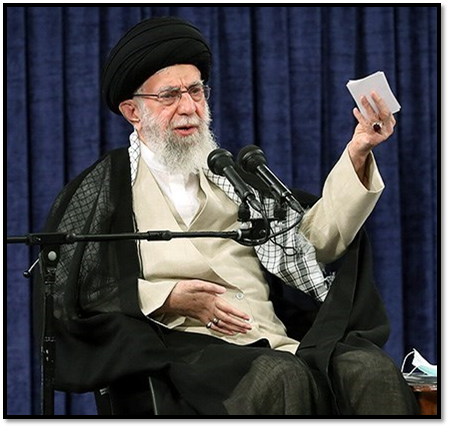Supreme Leader Ayatollah Ali Khamenei pardoned or reduced the sentences of tens of thousands of prisoners, including some protesters, to mark the 44th anniversary of the Islamic revolution. But the pardons were heavily conditioned on good behavior, a formal apology, and a pledge not to engage in protests or other activities undermining the state. “Naturally, those who do not express regret for their activities and give a written commitment not to repeat those activities will not be pardoned,” deputy judiciary chief Sadeq Rahimi stipulated in the announcement on February 5. The government also said that prisoners guilty of “corruption on earth” – a vague charge often used at critics– were also not offered clemency.

More than 19,000 people were reportedly detained for nationwide demonstrations between mid-September and the revolution’s anniversary in mid-February 2023, according to human rights groups. A “remarkable number” of protesters have expressed regret and requested pardons, the judiciary chief Gholam Hossein Mohseni Ejei wrote in his proposal to Khamenei. Iranian officials have blamed the unrest on the United States, Israel and Saudi Arabia as well as opposition groups in the diaspora.
The pardons, however, did not signal an end to the government crackdown. Elnaz Mohammadi, a journalist for Hammihan, a newspaper aligned with reformists, was detained at Evin Prison on the day the pardons were announced. She had been covering the nationwide demonstrations. Her sister, Elaheh Mohammadi, was arrested in September 2022 after she reported for the same paper on the death of Masha Amini, who died after being detained for improper dress. As of January 2023, at least 47 journalists were imprisoned in connection to the protests, human rights groups reported.
“Khamenei wants brownie points for saying he’s going to release prisoners who were unlawfully arrested to begin with,” said Hadi Ghaemi, executive director of the Center for Human Rights in Iran (CHRI). “This so-called ‘pardon’ is nothing but a shameless public relations stunt that shows the completely arbitrary nature of justice in the Islamic Republic, where arrests and releases are at the whim of the state.”
Khamenei has issued similar pardons in the past to mark important occasions. In February 2022, he pardoned or reduced the sentences of 3,388 prisoners in the runup to the anniversary of the revolution. In 2021, he pardoned 1,849 prisoners to celebrate a Shiite festival. Article 110 of the constitution grants the supreme leader the power to pardon on the recommendation of the judiciary chief.
Iran has traditional criminal and civil courts, but it also has separate revolutionary courts. The revolutionary courts were created after the ouster of the monarchy to persecute adversaries of the new Islamic Republic. For decades, the judiciary has often denied detainees due process. Confessions have been extracted through torture. After sham trials, some lasting only 15 minutes, protesters have received long prison and death sentences.
The supreme leader’s pardons did not cover prisoners charged with the following crimes:
- Murder
- Spying for foreign agencies
- Having contact with foreign agents
- Destruction of state property
- Armed drug smuggling
- Arms trafficking
- Kidnapping
- Acid attacks
- Rape
- Armed robbery
- Bribery
- Embezzlement
- Forging currency
- Money laundering
- Alcohol smuggling
- Organized smuggling of commodities
In March 2023, the judiciary clarified that 82,656 prisoners – including 22,628 linked to the demonstrations – had been pardoned. Some detainees reportedly had to sign letters repenting for their alleged crimes.
